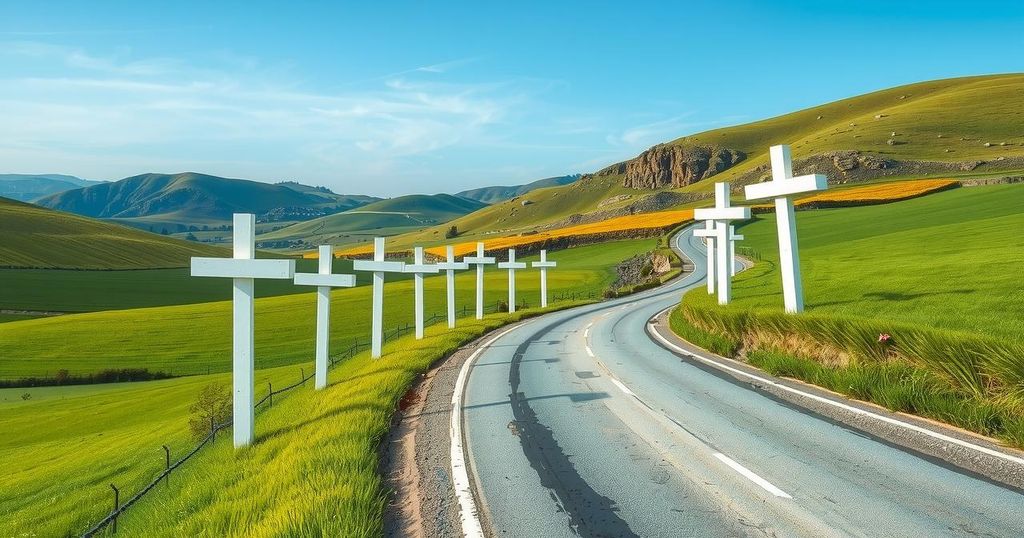South Africa’s Police Minister Disputes Trump’s Genocide Claims Regarding Farmers
South Africa’s Police Minister Senzo Mchunu rebuffs President Trump’s claims about a video allegedly showing burial sites for white farmers, asserting that it was a temporary memorial. Mchunu emphasizes the need for accurate information regarding violent crime and race relations in South Africa, dismissing Trump’s narrative as misinformation. The government urges for a comprehensive understanding of these serious issues.
In a significant statement, South Africa’s Police Minister, Senzo Mchunu, strongly rebutted U.S. President Donald Trump’s claims regarding a video displayed during their recent meeting in Washington. Trump alleged that the video depicted burial sites for over a thousand white farmers, asserting that it illustrated a genocide narrative that Mchunu firmly dismissed as misleading.
The video in question showed an aerial view of a rural road adorned with white crosses, which Trump described as graves. In contrast, Mchunu clarified that these crosses served as a temporary memorial established in 2020, memorializing farmers who had met tragic fates, not substantiating claims of mass extermination directed at white farmers.
Mchunu articulated that the memorial commemorated all farmers who have lost their lives due to violence in South Africa, emphasizing, “They are not graves. They don’t represent graves.” This statement raises critical points about the misrepresentation of serious social issues, particularly amidst the ongoing narrative surrounding violent crime in the country.
The minister’s remarks follow a period of heightened tensions following Trump’s claims about a supposed genocide against white farmers in South Africa, which the South African government has consistently refuted. The statistics presented by Mchunu reveal a grim crime landscape: of over 5,700 homicides reported this year, only six were farm-related, with one victim being white. This highlights the complexity of crime in South Africa, which disproportionately affects both white and Black farmers alike.
Lourens Bosman, a former lawmaker who participated in the original procession, echoed Mchunu’s sentiments, framing the memorial as a representation of shared grief among all communities affected by farm violence. He noted that the crosses symbolized solidarity against violence, rather than a specific commentary on race.
Furthermore, Mchunu stated, “We have respect for the president of the United States, but we have no respect for his genocide story whatsoever,” underscoring the need for accurate information regarding South Africa’s societal issues. The South African government remains adamant that Trump’s comments are steeped in misinformation and have exacerbated tensions involving race and violence in the country.
In context, Trump’s executive order issued earlier this year, which halted U.S. financial aid to South Africa, accused the government of abusing its authority over land ownership and fostering violence against white landowners. This has further strained relations and sparked a response from South Africa’s leadership, advocating for a more nuanced understanding of their social realities.
Their engagement with Trump reflects efforts by South African President Cyril Ramaphosa to reshape perceptions and dialogue surrounding his country, especially after the president sought to clarify misconceptions during their recent discussions. While the political arena enters a complex phase, the focus remains on ensuring that narratives related to violence and race are addressed comprehensively and respectfully.
Racial tensions in South Africa continue to evolve, revealing a challenging landscape that necessitates sensitive discourse and unfiltered reflections on history and current events.
In summary, South Africa’s Police Minister Senzo Mchunu strongly criticized President Trump’s misleading remarks regarding alleged genocide against white farmers. The minister clarified that the crosses seen in the video were memorials for victims of violence, rather than burial sites. This statement reflects ongoing efforts by the South African government to combat misinformation and enhance dialogue surrounding sensitive socio-economic issues in the country. As the situation unfolds, it underscores the importance of accurate narratives in addressing complex societal challenges.
Original Source: apnews.com




Post Comment